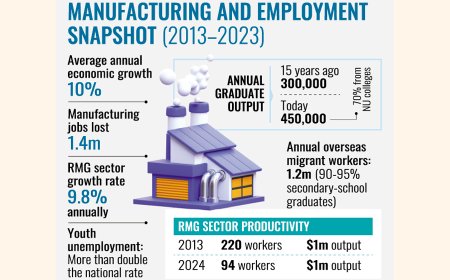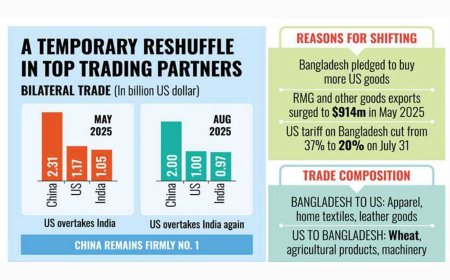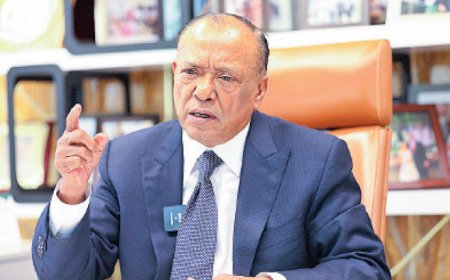Will the country experience significant growth next year?
Will the country experience significant growth next year?

- The rapid growth of GDP has been driven by increased government spending funded by domestic and foreign loans. However, rising government debt does not necessarily result in a decline in GDP
The World Bank recently projected that Bangladesh’s GDP growth rate for the ongoing fiscal year 2024-25 will drop to 4 percent, down from 5.2 percent in the previous fiscal year. Initially, the global lender had forecasted a growth rate of 5.7 percent for this period, while the IMF estimated a rate of 4.5 percent. Many critics are attributing this decline to the performance of the interim government. Given the circumstances following a mass uprising, it would not be surprising if GDP growth turned negative; thus, these new forecasts can be seen as somewhat encouraging.
Over the past 15 and a half years, Hasina’s government has pursued a policy of increasing investment and government spending through various internal and external loans. While these measures temporarily boosted the growth rate, they were not sustainable. Despite the influx of foreign loans, private sector investment as a percentage of GDP has fluctuated between 23 and 24 percent over the last decade. However, the GDP has increased primarily because foreign and domestic loans have been funneled into unnecessary projects. Meanwhile, government revenue collection has declined to 8 percent of GDP. The rapid GDP growth has come from increased government spending through local and foreign loans, but this rising debt does not necessarily correlate with a decrease in GDP.
According to a report published in the daily Bonik Barta on August 7, the total internal and external debt of the Bangladesh government exceeded Tk 18.35 trillion as of August 5, 2024. In comparison, when Sheikh Hasina took power on January 6, 2009, the total debt was only Tk 2.76 trillion, marking a staggering increase of Tk 15.58 trillion. Before leaving the country on August 5, Hasina bequeathed a debt of Tk 18.35 trillion while promoting high per capita GDP growth. As of 2024, the per capita debt burden has surpassed Tk 100,000. The repayment of foreign loans is expected to significantly impact the economy for at least the next decade. Per capita GDP is calculated by dividing total GDP by the total population. Former Finance Minister Mustafa Kamal was accused of turning the Bangladesh Bureau of Statistics into a center for "data doctoring," inflating GDP figures while understating the population.
Over the last decade, Hasina’s government has received both domestic and international praise for its purported high GDP growth rates. However, much of this recognition has been exaggerated. The concept of per capita GDP itself is fundamentally flawed, as it masks income distribution disparities between a small number of wealthy individuals and the majority of low-income earners. For instance, averaging the income of a multimillionaire with that of a person earning nothing would present a misleadingly high per capita income figure.
If income inequality rises alongside per capita GDP growth, the benefits of this growth tend to concentrate among a few wealthy individuals, leaving the majority without their fair share. One method of measuring this inequality is the Gini coefficient. A Gini index of zero indicates equal income distribution, while an index of one signifies total income concentration in one individual. In Bangladesh, the Gini coefficient was 0.36 in 1973 and steadily increased to an alarming 0.499 in 2022. A Gini coefficient above 0.5 classifies a country as having "high income inequality," indicating that by 2024, Bangladesh is among those nations.
This strategy of artificially inflating GDP growth through excessive borrowing has plunged the nation into a severe long-term debt crisis, particularly dangerous because a significant portion of this debt has been lost to capital flight. During Hasina's tenure, capital flight has emerged as the "number one problem." A New York-based research organization, Global Financial Integrity, estimates that approximately $149.20 billion has left Bangladesh from 2009 to 2024.
Hasina’s authoritarian regime has promoted a narrative of impressive per capita GDP growth over the past 15 and a half years while embezzling national wealth and transferring it abroad. Allegations of capital flight have been especially leveled against those connected to the Sheikh family, as well as corrupt oligarchs, politicians, and bureaucrats. Sohel Taj, son of Bangladesh’s first prime minister Tajuddin Ahmad, quoted Hasina as saying in 2009 that the BNP had accumulated substantial wealth, suggesting that they now needed to "make money with both hands."
Currently, under the interim government, capital flight has decreased significantly. As a result, both private sector investment and government spending are expected to decline substantially in the current fiscal year, leading to a projected drop in GDP growth.
Additionally, political instability following protests and uprisings in July, August, and September, combined with production issues in the garment sector, has disrupted overall economic output, negatively impacting GDP growth. Thus, if the growth rate falls to 4 percent or 4.5 percent this fiscal year, it would not be surprising.
However, there is also cause for optimism. Under Professor Yunus's leadership, the government is implementing appropriate policies aimed at revitalizing the banking sector and the overall economy. Thanks to Yunus’s reputation, approximately $10 billion in foreign aid is anticipated to flow into the economy in the coming months, which will significantly enhance the country’s foreign currency reserves. Additionally, there has been a surge in remittances from Bangladeshi expatriates using formal channels. If this trend continues, the economy is likely to experience positive changes.
Most importantly, the current government is patriotic and committed to fighting corruption. Thus, it is reasonable to expect that the country will return to a path of high growth in the upcoming fiscal year.
What's Your Reaction?



















































































